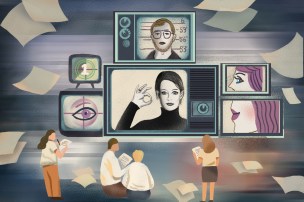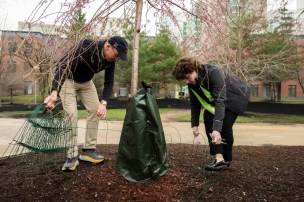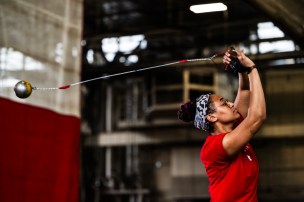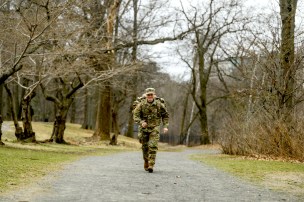Published on
Trauma cards, board games, remaking courthouses: NuLawLab gets creative in social-justice mission
Northeastern’s groundbreaking law lab connects artists, designers and law students to open up the law to more people. Ten years old this spring, the NuLawLab was one of the first design labs at a law school.
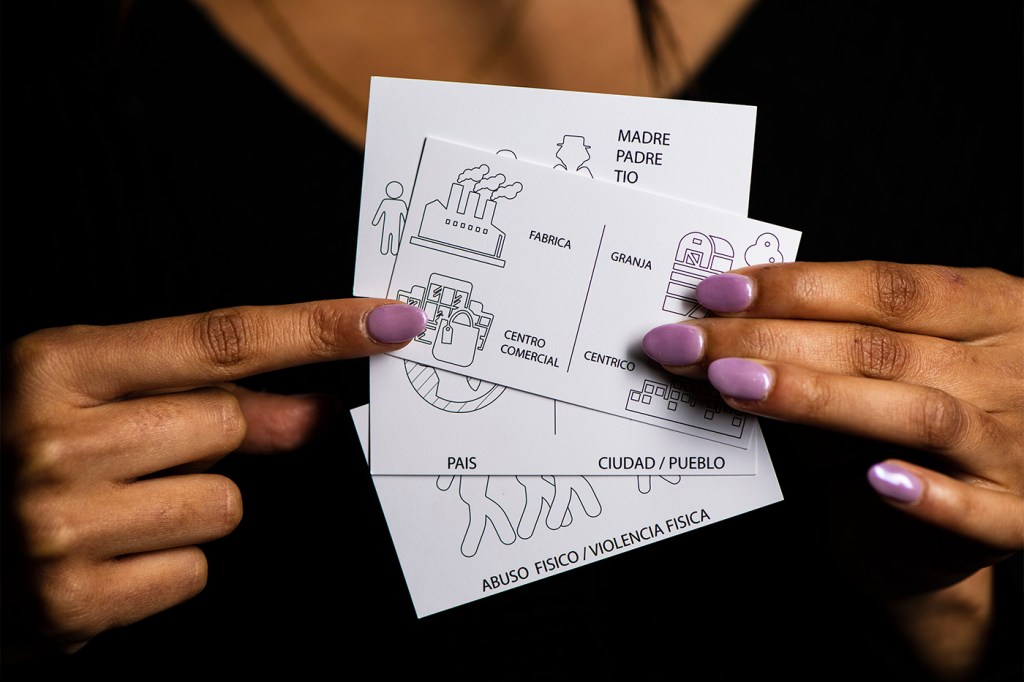
The white cards are small, the size of business cards, but they’re meant for something else altogether.
Most of them feature human figures, in a style familiar from pedestrian-crossing and restroom signs. Others represent places: a factory, a hospital, a home. All the words are in Spanish. Several of the human-figure cards depict traumas: “emotional abuse,” “physical violence.”
These “trauma cards,” designed by Northeastern University students in a project spearheaded by Northeastern’s law lab, were created in 2019 to give asylum-seekers in Texas a way to describe the dangers they fled. Northeastern law students, volunteering at the border, used the cards to help prepare the asylum-seekers for all-important interviews with immigration officials.
“The cards are to get them to be able to tell some really difficult stories,” says Zoe Bowman, a Northeastern law graduate who was part of the 2019 volunteer trip. “A lot of the cases were Central American women fleeing domestic violence, sexual assault or other sexual abuse, which is a really difficult topic to open up about. So they were used as a way to get people talking.”
It worked. Nearly all of the asylum seekers that the Northeastern law students talked to went on to success in their “credible fear interviews,” which allowed them to remain in the U.S., Bowman says.
It’s just one innovative product of Northeastern’s law lab, officially named NuLawLab. It applies design thinking to the law, teaching future lawyers to think creatively and to pioneer innovative ways that law students and lawyers can help others.
The trauma cards were produced by a joint law school and design class. Students spent weeks researching the asylum process, the conditions that asylum-seekers were fleeing, and the experiences of others who had interviewed migrants about the dangers they’d faced back home.
“What impressed me about the law lab was that they were teaching students how to use the law as a creative world-making tool,” says Sarah Kanouse, the Northeastern art and design professor who co-taught the class. “We often think of the law as something that’s very rigid and inflexible, but that’s actually not true. And I think the NuLawLab is really encouraging students to approach the law from a place of: ‘What kind of world do I want to live in?’”
Ten years old this spring, the NuLawLab (pronounced “new law lab,” to stress its focus on new ideas) was one of the first design labs at a law school, says Dan Jackson, a 1997 graduate of Northeastern University School of Law who has been the lab’s director since its opening. The lab continues to break new ground: This year it received a grant from the National Endowment for the Arts’ research lab program, making NUSL the first law school to receive the grant.
A primary focus of NuLawLab is making the law more accessible to marginalized people—an outgrowth, Jackson says, of the social-justice and public-interest mission that has driven NUSL since its 1968 founding.
Siri Nelson, a 2019 law school graduate, participated in a NuLawLab seminar on how to communicate across political lines at a time of deepening polarization. “It’s had a really massive effect on my legal career,” says Nelson, who’s now executive director of the National Whistleblower Center and an NUSL adjunct professor. The seminar students created a board game, “I’m Not Convinced,” which Nelson describes as “kind of like Pictionary, where you have to use limited information to convey an idea and see if you could convince the other person to agree with you.”
NuLawLab, Nelson says, “challenges the basic idea that you have to be a certain way in order to practice law effectively.” She credits NuLawLab’s experimental thinking for pushing her to stay on top of new technology and innovation, which helps her in her field of whistleblower law. “Sometimes the answers are not exactly where you were looking for them and where you would expect to find them,” she says.
Several NuLawLab projects have led to tangible results off-campus. In 2018, the NuLawLab used its approach to propose successful changes in how the Boston Housing Court organizes its space, to make it more welcoming to tenants. Jackson and a NUSL student embedded in a Wentworth Institute of Technology graduate architecture seminar called More Than Buildings, which studied how people use spaces and how the spaces’ design affects how people use them.
What impressed me about the law lab was that they were teaching students how to use the law as a creative world-making tool.
Sarah Kanouse, a Northeastern art and design professor
Following recommendations from the NuLawLab and the Wentworth students, the Boston Housing Court posted large signs on columns and beams in its atrium to make key offices unmissable. The court also installed privacy booths that allowed tenants and landlords to have private conversations with their attorneys. Before that, opposing parties often had to sit next to each other while preparing for court.
For years, the NuLawLab’s creative director, Jules Rochielle Sievert, has collaborated with housing activists in East Boston. In one project, NuLawLab students worked with East Boston residents to record a podcast about people’s experiences with housing instability and insecurity. Jackson says it’s a constructive alternative to the debates that often break out at Boston Planning & Development Agency hearings about new developments, where longtime residents who feel powerless often express angry concerns about how new housing might change their neighborhood.
“Arts and culture programming allows people to talk about housing insecurity and housing instability,” Jackson says, “in a way that is not fueled by anger, but fueled by creativity, reflection, exploration and play.”
Now, thanks to the National Endowment for the Arts grant, NuLawLab is launching a new program in East Boston. It’s testing whether “cultural organizing for housing rights and arts programming can contribute to residents’ sense of belonging and social cohesion,” Jackson says. Working with Maverick Landing Community Services, a social services agency, the NuLawLab will co-host a two-year series of arts events, with help from Northeastern design and health science students. Northeastern’s Public Evaluation Lab will conduct studies to see if the events contribute to residents’ sense of community belonging.
Because the NuLawLab often designs its projects along law students’ interests, it has some unfinished work on its books, waiting for another student to pick it up and run with it. In 2021, NUSL student Katie Mieher researched Massachusetts courts’ procedures for approving adult adoptions—which some LGBTQ people use to establish legal ties with their chosen family instead of their estranged family of origin. “The goal of the project,” says Mieher, “is to develop resources that would allow people to successfully complete the adoption process without hiring a lawyer.”
Mieher created a research report for NuLawLab’s internal use, with the goal (not yet funded) of having another student adapt it into a public guide for adoption-seekers. “I was able to apply my legal research skills by doing all this in-depth research on the adoption statute and court processes,” says Mieher, who graduated from NUSL this spring. “It was a breath of fresh air in a lot of ways during law school, which is a lot of sitting in class, learning doctrine.”
Soon, the NuLawLab will share its 10 years of experiments, results and insights in a book, “Legal Design: Dignifying People in Legal Systems,” forthcoming from Cambridge University Press in late 2023 or the first half of 2024. “Our motivation is to introduce legal design to the world,” says Miso Kim, an experience design professor at Northeastern and a co-editor of the book. “We believe that legal design can truly transform the field of law. We want to highlight the importance of dignity as a principle in legal design.”
Already, legal design is a rapidly growing trend, says Jackson. The term, which usually refers to collaborations among artists, designers and lawyers, dates back about a decade. “It has gained an awful lot of traction within the courts,” Jackson says. “Courts are saying, ‘Yes, let’s make this more efficient and better.”
Meanwhile, legal design has spread to Europe and to other U.S. universities, including Suffolk University in Boston as well as Stanford, Duke and Georgetown. “There are maybe 15 law school innovation labs now, many of which we help out with,” Jackson says. “They come to us and they say, ‘Well, you’ve been doing it for 10 years. How do you do it?’”
Erick Trickey is a Northeastern Global News Magazine senior writer. Email him at
e.trickey@northeastern.edu. Follow him on Twitter @ErickTrickey.

